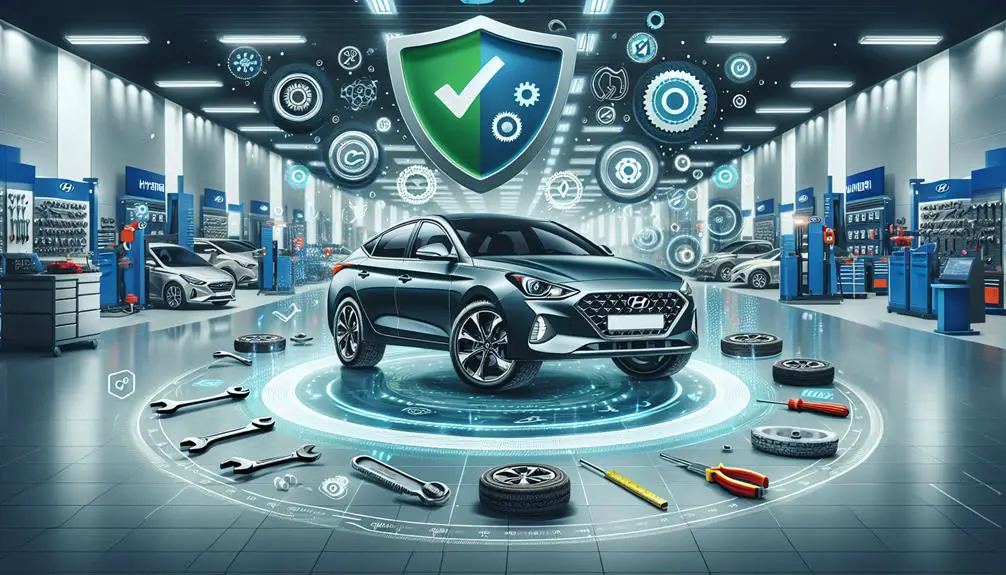Hyundai's warranty does not directly cover tires as these are typically warranted by the tire manufacturers themselves.
The comprehensive Hyundai warranty excludes tires, but you can seek coverage or claims directly through the tire manufacturer under their specific warranty terms.
Understanding the limitations and exclusions of both Hyundai's warranty and the tire manufacturer's warranty is crucial for effectively managing tire-related issues.
Hyundai Warranty Overview

Hyundai offers a warranty program that provides extensive coverage for your car, ensuring it stays in good condition. This warranty covers many parts and systems in the car that might fail due to manufacturing defects.
It includes a long-term powertrain warranty, which covers the engine and transmission. The warranty also covers electrical system issues, like computer or wiring malfunctions.
Additionally, Hyundai provides an anti-perforation warranty against rust in certain parts of the car. However, the warranty doesn't cover regular maintenance or wear and tear, so regular service is necessary to keep the warranty valid.
Tire Coverage Explained
Hyundai's warranty covers many parts of your car, but tires are different. Here's what you need to know about tire coverage for Hyundai:
- Warranty Source: Hyundai doesn't cover tires. Instead, the tire maker does. If you have tire problems, contact them.
- Warranty Length: Tire makers offer warranties for 1 to 5 years, covering material and workmanship defects.
- Tread Warranty: Some warranties cover tire tread wear for a certain mileage. If tires wear out too soon, you might get a partial refund.
- Road Hazard Coverage: This isn't usually part of the tire warranty but can be bought separately. It covers damage from things like punctures.
Knowing this can help you deal with tire issues better and keep your Hyundai in good shape.
Exclusions and Limitations

Know what your tire warranty doesn't cover to avoid surprises. It doesn't cover damage from accidents, vandalism, or natural disasters. For example, damage from a pothole isn't covered. Normal wear and tear are also not covered, meaning you pay for replacements if tires wear out from regular use.
Not maintaining your tires properly, like not rotating them or driving on tires that are too inflated or not inflated enough, means the warranty won't cover any resulting damage. Changing your tires or vehicle in ways that affect performance, such as re-treading tires or adding sealants, also voids the warranty.
The warranty doesn't cover certain tires, including those used for business or those that weren't originally on your vehicle. Knowing these exclusions helps you take care of your tires and avoid paying extra.
Claiming Tire Warranty
To claim a tire warranty from Hyundai, follow these steps:
- Gather all necessary documents such as your purchase receipt, warranty details, and any service records to prove your eligibility.
- Examine the tire damage closely to understand its extent and type. This will help you explain the issue better when contacting Hyundai or visiting a dealer.
- Contact Hyundai directly or visit an authorized dealer. Clearly explain the situation and the tire damage.
- Follow any instructions given by Hyundai or the dealer, including bringing your vehicle in for inspection, to ensure your claim is processed quickly.
Preventive Measures and Tips

To reduce tire damage and increase their life, follow these steps:
- Check tire pressure monthly and before long trips. Wrong pressure causes wear and can lead to blowouts.
- Check tire tread depth. If Lincoln's head is visible in the penny test, you need new tires.
- Rotate tires every 5,000 to 8,000 miles for even wear.
- Drive gently. Rough driving wears tires quickly.
- Don't overload your vehicle. Extra weight harms tires.
Following these steps helps maintain tires and avoid expensive replacements.
Conclusion
To sum it up, Hyundai's warranty usually doesn't cover tires because the tire maker is responsible for that. But, there are some exceptions, so it's good to check your policy.
If your tires have problems, you should quickly talk to the tire company.
To keep from having issues later, make sure to regularly check and take care of your tires.
Knowing what to do and taking action early can help you avoid extra costs and trouble later on.